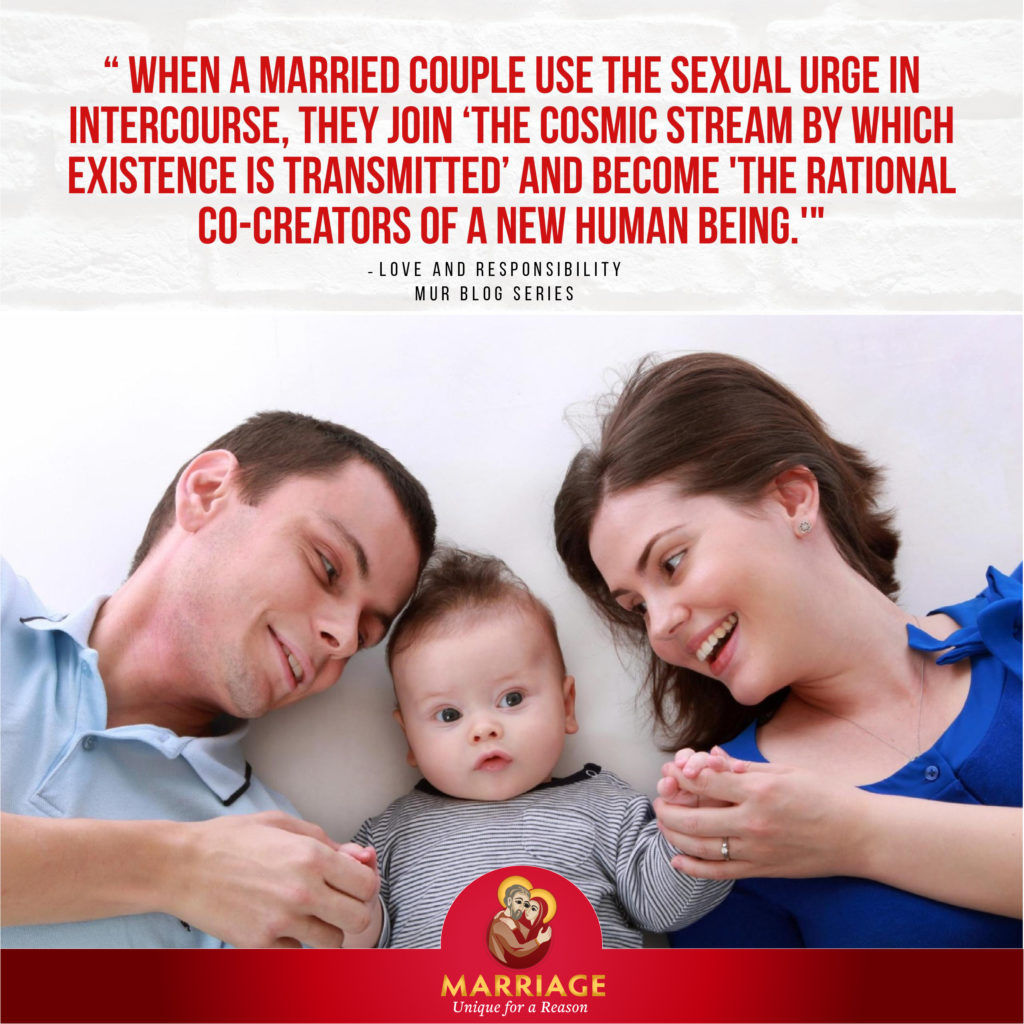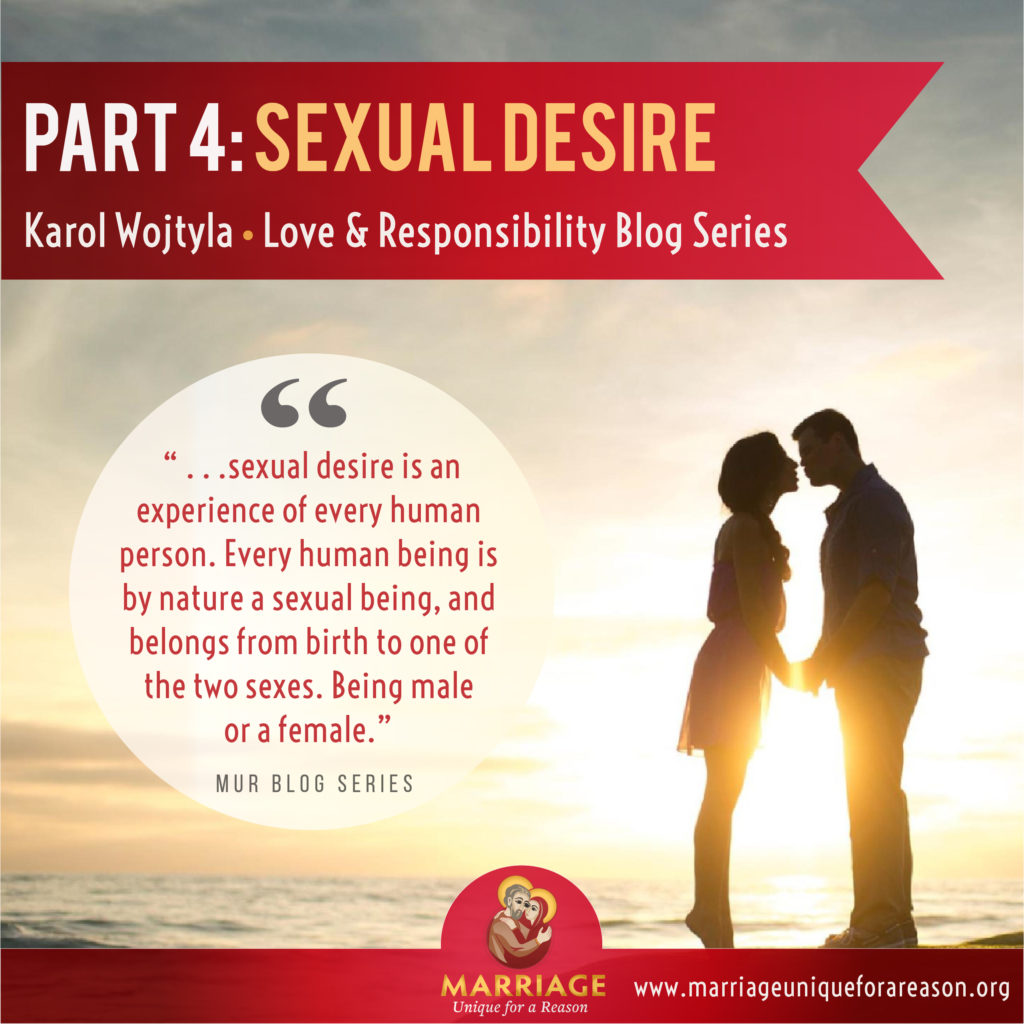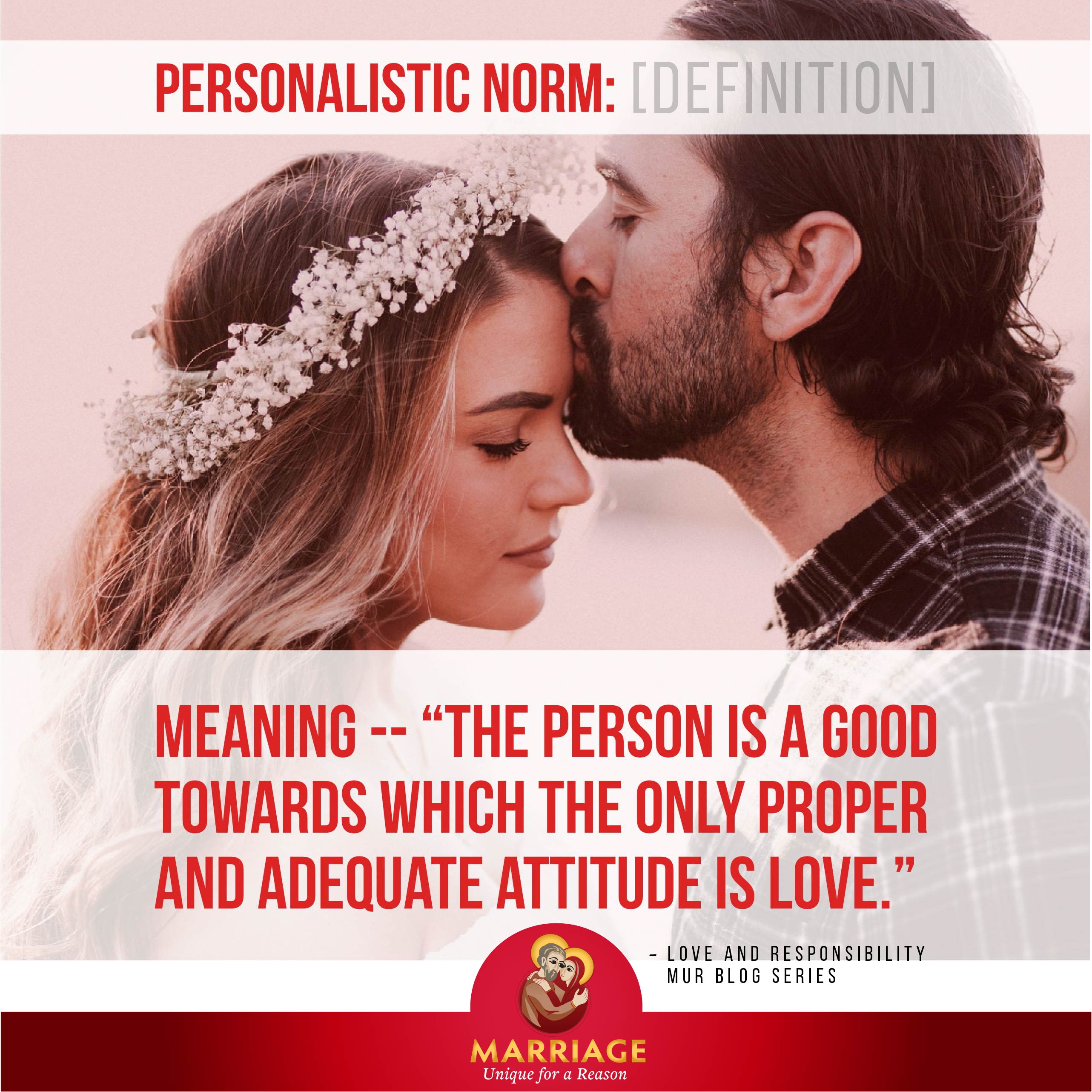Love as Attraction: Love and Responsibility Series (Post #5)
 In the section entitled, “The Metaphysical Analysis of Love,” Karol Wojtyla discusses a number of aspects that make up the “invisible” side of love, namely attraction, desire, goodwill, reciprocity, and friendship. These are experiences that men and woman have when they meet one another. Today we focus on attraction.
In the section entitled, “The Metaphysical Analysis of Love,” Karol Wojtyla discusses a number of aspects that make up the “invisible” side of love, namely attraction, desire, goodwill, reciprocity, and friendship. These are experiences that men and woman have when they meet one another. Today we focus on attraction.
An attraction—a “liking”— happens quite naturally between men and women. An instant or initial attraction occurs, Wojtyla writes, as a result of natural sexual desire, but in order to really like someone on the personal level, we have to know them. Attraction to another person—a man to a woman, a woman to a man—“does not mean just thinking about some person as a good, it means a commitment to think of that person as a certain good, and such a commitment can in the last resort be effected only by the will.”[i] This is a really important point: we have to consent to an  attraction before it will really take hold. Feelings may arrive spontaneously, but not a full attraction of one person to another.
attraction before it will really take hold. Feelings may arrive spontaneously, but not a full attraction of one person to another.
Our culture says the opposite: that attraction is a blind force, a passion, that moves people without their consent.[ii] We think that we have to be attracted to so-and-so; we have no choice in the matter. Wojtyla says that is not true: “At the base of attraction is a sense impression, but this is not decisive in itself. For we discover in an attraction a certain cognitive commitment of the subject, a man, let us say, towards the object, in this case a woman.”[iii]
Let’s say that a man sees a woman at a bar and is struck by her; He thinks she’s the most beautiful woman he’s ever seen. He starts walking over to ask for her number… when he realizes that she’s wearing a wedding ring. If he’s a good man (we’re going to presume that he is), the moment is over. “That woman at the bar” may always be the most beautiful woman the man has ever seen, but he’s not going to nurture an attraction toward her. He knows that being attracted to someone else’s wife is not going to make him happy. (Obviously, if he decided that he had “no choice” but to pursue an attraction to her regardless of her marriage, he’s not a good man!)
Wojtyla also analyzes the unpredictability of attraction, pointing out that every human person is complex and reacts to different qualities in others based on temperament, past experience, family background, etc. You can never tell who is going to like each other!  We are all a mixed bag, if you will. (Wojtyla’s phrase is “uneven good.”[iv]) This is why setting friends up on blind dates can be risky (though it’s a risk we encourage you to take!).
We are all a mixed bag, if you will. (Wojtyla’s phrase is “uneven good.”[iv]) This is why setting friends up on blind dates can be risky (though it’s a risk we encourage you to take!).
Wojtyla writes that an attraction must discover that it is rooted in the truth about the person before it can be called love. Perhaps Sally thinks that Harry is kind, but then she sees him repeatedly acting in an unkind way. Perhaps Harry thinks Sally is sweet and then finds her kicking puppies. This is when disillusionment sets in: “This person isn’t who I thought they were!” Wojtyla writes, “This emptiness and the feeling of disappointment which goes with [this experience] often produce an emotional reaction in the opposite direction: a purely emotional love often becomes an equally emotional hatred for the same person.”[v] That’s why it’s so important to always seek to know the real person, not the image in your head!
To sum things up: attraction is the beginning of love, but requires knowledge and truth to become the kind of love that marriage can be built on.
[i] Wojtyla, Karol. Love and Responsibility (San Francisco: Ignatius Press, 1993), p. 75.
[ii] Notably, in Dante’s Inferno, the adulterous couple Francesca and Paolo who are in hell because of their sin of lust are battered about by the winds, unable to control their movements forever as they were unable to use self-control in life.
[iii] Ibid, p. 75.
[iv] Ibid, p. 76.
[v] Ibid, p. 79.
[i]Wojtyla, Karol. Love and Responsibility (San Francisco: Ignatius Press, 1993), p. 75.
[ii] Ibid, p. 75.
[iii] Ibid, p. 76.
[iv] Ibid, p. 79.
Archive
Sexual Desire: Love and Responsibility Series (Post #4)

The Human Person’s Sexual Desire:
The second major section in the first chapter of Love and Responsibility is called “Interpretation of the Sexual Urge”—we are going to call this “sexual desire” since that is more familiar. In this section, Wojtyla lays out a few different ways of looking at sexual desire in the life of a human person.
Sexual desire is “instinctual” in the human being in that it is aimed at the survival of the species and is not a result of conscious deliberation. But while instinct implies a blind force that must be obeyed, sexual desire, while it is a natural drive, does not compel a person to obey it. After all, “Man is by nature capable of rising above instinct in his actions.”[1] While bodily reactions occur without a person choosing them, ethics come into play as soon as the person makes a choice.
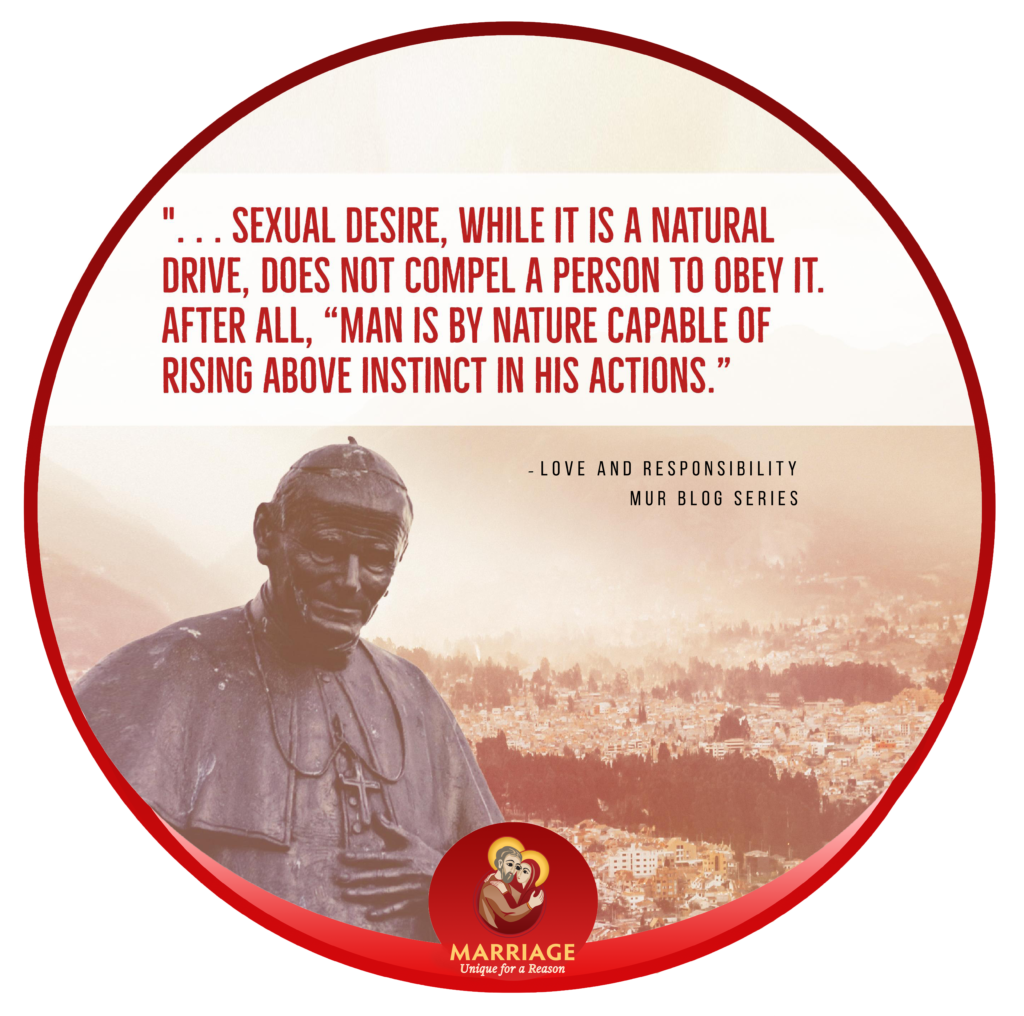 “Man is not responsible for what happens to him in the sphere of sex since he is obviously not himself the cause of it, but he is entirely responsible for what he does in this sphere.”[2] [Author’s note: Teaching young people the difference between a reaction they are not responsible for and a deliberate choice to consent to the reaction or further it is an important task for parents, youth ministers, pastors, and other trustworthy adults.]
“Man is not responsible for what happens to him in the sphere of sex since he is obviously not himself the cause of it, but he is entirely responsible for what he does in this sphere.”[2] [Author’s note: Teaching young people the difference between a reaction they are not responsible for and a deliberate choice to consent to the reaction or further it is an important task for parents, youth ministers, pastors, and other trustworthy adults.]
Wojtyla notes that sexual desire is an experience of every human person. “Every human being is by nature a sexual being, and belongs from birth to one of the two sexes.”[3] Being male or a female “means that a person’s whole existence has a particular orientation which shows itself in his or her actual internal development… and in the normal course of things… manifests itself in a certain natural predilection for, a tendency to seek, the other sex.”[4] In other words, we are “oriented” in an objective way: male toward female, female toward male.[5]  It is written into our bodies. “Sexual attraction,” Wojtyla writes, “makes obvious the fact that the attributes of the two sexes are complementary, so that a man and a woman can complete each other.”[6] Each of the sexes reveals one of the two ways of being human.
It is written into our bodies. “Sexual attraction,” Wojtyla writes, “makes obvious the fact that the attributes of the two sexes are complementary, so that a man and a woman can complete each other.”[6] Each of the sexes reveals one of the two ways of being human.
The continuation of humanity depends on individual people “obeying” their natural sexual desire and giving life to new human beings. Wojtyla argues that because sexual desire leads to new persons who have immortal souls, it is not solely of biological significance but existential: “It is bound up with the very existence of the person.”[7] Sexual desire thus gives an objective purpose and a shape to the love between a man and a woman—i.e. it’s important not just for the two of them, but for the world.[8]
The Religious Interpretation of Sexual Desire:
In the next sections, Wojtyla addresses the religious interpretation of sexual desire, followed by two misinterpretations. The religious significance of sexual desire is that it furthers the work of creation: when a married couple use the sexual urge in intercourse, they join “the cosmic stream by which existence is transmitted”[9] and become “the rational co-creators of a new human being.”[10] The two misinterpretations are: 1.) the body is evil and sexual intercourse is only a “necessary evil” for procreation and, 2.) a tendency to see all of human behavior in light of sexual desires and the pursuit of sexual pleasure. Wojtyla shows that neither of these interpretations are adequate.
In his “Final Observations,” Wojtyla writes that the Church has always taught two ends of marriage: procreation and mutual help. These aims will be fulfilled by following the personalistic norm (The only proper response to another human person is love). “Sexual morality and therefore conjugal morality consists of a stable and mature synthesis of nature’s purpose with the personalistic norm.”[11] In other words, knowing what is right and wrong when it comes to sex depends on knowing what nature’s purpose is (sex = babies) and what the loving thing to do is (according to what [who] a human person is). These things together are what give an objective form to love between man and woman.
[1] Wojtyla, Karol. Love and Responsibility (San Francisco: Ignatius Press, 1993), p. 46.
[2] Ibid, p. 47.
[3] Ibid, p. 47. Wojtyla notes here that this fact is not contradicted by persons who are born with ambiguous genitalia and the like, any more than any other disorder or disability puts human nature into question.
[4] Ibid, p. 48.
[5] The term “sexual orientation” today denotes a subjective feeling of attraction, but such a feeling can never change the objective nature and purpose of one’s sexual nature.
[6] Ibid, p. 48.
[7] Ibid, p. 52.
[8] Ibid, p. 53.
[9] Ibid, p. 54.
[10] Ibid, p. 55.
[11] Ibid, p. 67.
Thus ends the section on “The Person and the Sexual Urge.” Next, Wojtyla discusses “The Person and Love.”
[1] Love and Responsibility, p. 46.
[2] Ibid, p. 47.
[3] Ibid, p. 47. Wojtyla notes here that this fact is not contradicted by persons who are born with ambiguous genitalia and the like, any more than any other disorder or disability puts human nature into question.
[4] Ibid, p. 48.
[5] The term “sexual orientation” today denotes a subjective feeling of attraction, but such a feeling can never change the objective nature and purpose of one’s sexual nature.
[6] Ibid, p. 48.
[7] Ibid, p. 52.
[8] Ibid, p. 53.
[9] Ibid, p. 54.
[10] Ibid, p. 55.
[11] Ibid, p. 67.
Archive
Use v. Love: Love and Responsibility Series (Post #3)
Between ‘Use’ and ‘Love’:
The first distinction that Wojtyla makes in Love and Responsibility, between “use” and “love,” is one that we understand intuitively. No one wants to be used; It’s a terrible feeling! We commonly learn that pretty early on in life—maybe at the 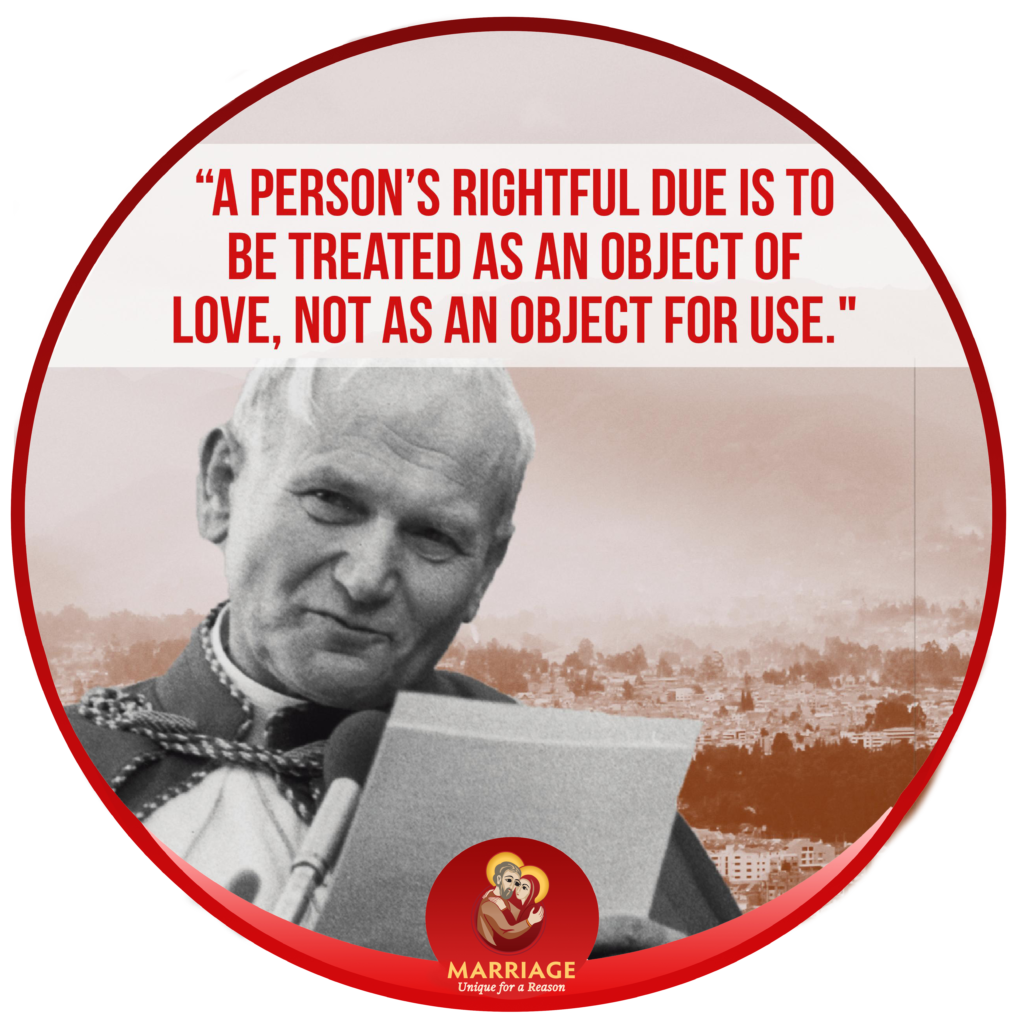 playground, or at a friend’s house—when we realize that the other kid only wants to play with us because we have the latest gadget that their parents won’t get for them. That’s such a small example, but these are real lessons in whether another person likes us for ourselves or only likes us for what we do for them.
playground, or at a friend’s house—when we realize that the other kid only wants to play with us because we have the latest gadget that their parents won’t get for them. That’s such a small example, but these are real lessons in whether another person likes us for ourselves or only likes us for what we do for them.
We all know that people can be used by others for sexual pleasure. This is not okay, even if the person consents to being used (such as in prostitution). A person has an inherent dignity that should rebel at even the suggestion that he or she should allow someone else to “use” them. But early childhood wounds, insecurity, or other factors may dull a person’s sense of how he or she deserves to be treated. In this section of Love and Responsibility, Wojtyla explains why using another person is incompatible with their dignity.
“To use means to employ some object of action as a means to an end—the specific end which the subject has in view.”[1] For example, I use a pencil to write on my calendar. The pencil is a means to the end of writing. My aim is to put something on my schedule; the pencil is just a means to accomplish that. In fact, a pen would do just as well. Chances are, I just picked up the closest tool, the closest object, that would do the job.
Karol Wojtyla’s Personalistic Norm:
When you think of it that way, it’s easy to see that a person shouldn’t be treated the same way as a pencil. Things are interchangeable, but persons aren’t. Wojtyla notes, “The sexual relationship presents more opportunities than most other activities for treating a person—sometimes even without realizing it—as an object of use.”[2] He calls us to be on guard against this tendency, which is in all of us to some extent.
There are lots of reasons why we may be tempted to treat another person as an object—as a means to our own pleasure or happiness. We may be more focused on our own feelings of loneliness or desire than on the actual person in front of us. But part of love is “a readiness to subordinate oneself” to the value of the person.[3] In other words, love means treating someone the way they deserve to be treated. If you love a person, you don’t want to use them—even if they were to mistakenly agree to be used.
So we come to what Wojtyla terms the “personalistic norm”—the way persons ought to be treated: “the person is a good towards which the only proper and adequate attitude is love.”[4] The personalistic norm is essentially the same as God’s commandment to love. You could even think of it as the Golden Rule: treat others the way you want to be treated. But again, sometimes we mistakenly forget that we are children of God and should be treated with love and respect—sometimes we settle for being treated “okay,” which means we might think treating others just “okay” is fine. Instead, it might help to think about a young child whom you love—whether yours, or one in your family—and how you want them to be treated. This can be clarifying, kind of like when you ask a teenage boy how his little sister should be treated on a date. We often are more protective of others’ hearts than our own.
To conclude: Treating the person with love (and not using them) is a step in fulfilling God’s call to love our neighbor.
[1] Wojtyla, Karol. Love and Responsibility (San Francisco: Ignatius Press, 1993), p. 25.
[2] Ibid, p. 30.
[3] Ibid, p. 31.
[4] Ibid, p. 41.
Archive
Person as Subject and Object: Love and Responsibility Series (Post #2)
As mentioned in the Introduction, Karol Wojtyla (St. John Paul II) is interested in what (who) the human person is. What makes us human? Are there ways of acting that are “less” or “more” human? How do we know?
Person as Subject and Object:
The first section of Love and Responsibility is entitled “The Person and the Sexual Urge,” and the first topic is the person as both the subject (do-er) and the object (done-to) of actions. If I hug you, then I am the subject of that action, and you are the object. That does not make you an object in the sense that I have dehumanized you (we’ll talk about that later), but simply is a way of saying that “every subject also exists as an object, an objective ‘something’ or ‘somebody.’”[i]
Man as ‘Someone’ Not ‘Something’:
But man* is an object in a different way from everything else in the world, because he has an inner life. He is “someone,” not “something.” The term “person” developed out of a desire to express this difference.  Animals, for all their individual quirks and affections, are not persons. A person—and here Wojtyla uses Boethius’s definition of “an individual being of a rational nature”—has a spiritual character. He has an inner life that centers around truth and goodness.[ii]
Animals, for all their individual quirks and affections, are not persons. A person—and here Wojtyla uses Boethius’s definition of “an individual being of a rational nature”—has a spiritual character. He has an inner life that centers around truth and goodness.[ii]
It is this inwardness that makes it even possible to talk about ethics. A person has the power of self-determination. He can choose. “No one else can want for me. No one can substitute his act of will for mine,” writes Wojtyla. [iii]
Self-Sacrifice Found in Human Witness:
Often the most amazing stories we hear and share are stories of people who refuse to want or choose something, even their own life, over another value that they hold dear. For example, St. Maximillian Kolbe wanted life for another prisoner over his own. Or consider the book and movie “Unbroken,” where Louie Zamperini survives a plane crash, floats on the sea 47 days, and suffers in a series of prisoner-of-war camps, but never gives up his desire to live. Or remember Corrie ten Boom, who hid many Jewish people in her home in WWII, knowing that at any moment she could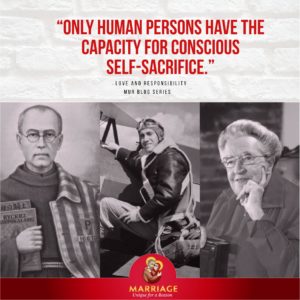 be caught. Only human persons have the capacity for conscious self-sacrifice.
be caught. Only human persons have the capacity for conscious self-sacrifice.
A person’s capacity to freely choose an action is the foundation of all ethics. When the object of a person’s action—that which is directly affected by what a person does—is another person, how much more important it is to know whether that action is good or evil. And since sexual morality almost always centers on the actions of one person with another person, then knowing what a person is, and how a person deserves to be treated, is crucial.
*I’m using “man” in its inclusive meaning of “human being, male or female.” It’s handy, less wordy, and conveys an idea of the common nature that we all share.
Click here to read the latest (all) –> Love and Responsibility Blog Series
[i] Wojtyla, Karol. Love and Responsibility (San Francisco: Ignatius Press, 1993), p. 21.
[ii] Ibid, p. 23.
[iii] Ibid, p. 24, emphasis original.

